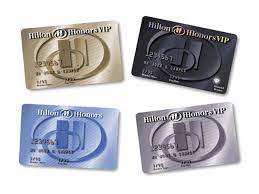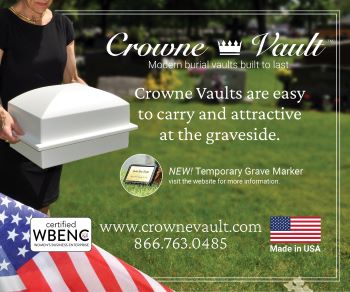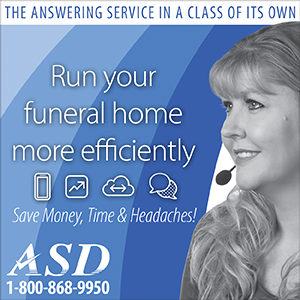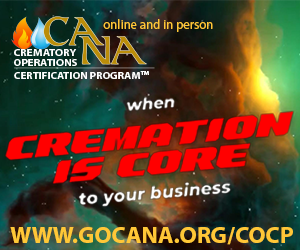Affinity programs and the funeral business
 Recently a new Casey’s Gas and Convenience store opened near me. Now, it is not the first Casey’s in our community, but it is very convenient to my home. So, I purchase gasoline, coffee, donuts, and made to order pizza there more often than any other store in town. I’m not a easy mark as an affinity card holder at different businesses, but the clerks convinced me to become a “Casey’s Member”. Being a member, I get discounts, free cups of coffee at times, and a certain number of pizza purchases eventually gets me some free pizzas.
Recently a new Casey’s Gas and Convenience store opened near me. Now, it is not the first Casey’s in our community, but it is very convenient to my home. So, I purchase gasoline, coffee, donuts, and made to order pizza there more often than any other store in town. I’m not a easy mark as an affinity card holder at different businesses, but the clerks convinced me to become a “Casey’s Member”. Being a member, I get discounts, free cups of coffee at times, and a certain number of pizza purchases eventually gets me some free pizzas.
Ironically, being a member I’ve increased my stops there because “If I have to get something, I’ll get points when I go to Casey’s”. And, I was a member of the Northwest, now Delta, frequent flier club back when I was involved in a couple of businesses that caused me to travel and I always booked with those carriers because of the eventual amenities that I received. . . . so, I think it is fair to say that affinity programs work.
What about in the funeral business? Multiple use and/or multiple purchases don’t seem to be the right program for an affinity business in death care. However, there should be a way for death care businesses to draw potential clients to them. In a sense, aftercare groups do that. . . they keep widows and widowers connected to the business and eventually, most widows and widowers become deceased clients of the same establishment that cared for their spouse. But, what else might there be?
Back in the later parts of the 20th century funeral homes really catered to churches and tried to become the provider of choice for different churches without alienating other denominations. Think of your old Catholic or Protestant firms that were really known for that.
While it is maybe not always the best strategy to niche yourself into a religious category this article from the Cleveland Jewish News reports on how the Plaza Memorial Chapel in New York City has used an affinity with the Jewish community to build their business. They have, however, not done it simply in a way of advertising, but by “becoming a leader in educating and supporting the Jewish community on end-of-life issues”.
For instance, the article points out that the funeral home “it helps train clergy, educators and Jewish community professionals. It runs programs in synagogues and Jewish community centers on Jewish rituals surrounding death. . .”
The article also points out that Plaza Memorial Chapel “has spent more than $1 million on grants for end-of-life education and support, as well as sponsored or co-sponsored some 20 conferences dealing with loss and bereavement.”
Plaza Memorial Chapel’s founding board chair Alfred Engelberg says, “We built a whole model based upon helping people rather than trying to make a profit.”
According to the article, Plaza Memorial Chapel is entering their third decade and has captured a growing segment of the Jewish funeral business in New York, New Jersey, and Connecticut. Plaza’s Executive Vice-President of Communal Partnerships, Stephanie Garry, had this to say in the article, “People reach out to us when they hear we are nonprofit. Since we opened our doors our business has more than tripled, and we are now one of the leading Jewish chapels in the metropolitan New York area. I believe we are the gold standard in terms of providing service to our families, and in being a thought leader and forward thinker for what we do to support the community.”

Tom Anderson
Funeral Director Daily
Funeral Director Daily take: While there are some differences because Plaza Memorial Chapel operates as a non-profit, I think there is a lot to learn from their modus operandi of reaching out and helping the community. While not technically an affinity group in the sense that consumers might think, I believe that Plaza’s unselfish use of their funds in the community that they serve is a juggernaut when it comes to growing market share.
I’m also of the opinion that for profit funeral establishments, in all sorts of communities, can build market share in this way. It shouldn’t just be about advertising and marketing in a paid space, a funeral home’s brand can be turned into a much more powerful statement by what the owners and employees do in the community.
Trust me. People, potential death care consumers, will notice when a firm unselfishly helps its community. Their are many ways to do that. Pick an avenue to do so, begin moving towards community help in that area, and I think it will eventually build a more positive brand for your funeral home.
More news from the world of Death Care:
- Funeral home customers trying to locate missing money. The Standard Democrat (MO)
- “Pass me an aneurysm hook”: The mother/daughter embalming team. Sydney Morning Herald (Australia)
- Plans progress to build Georgia’s largest veteran cemetery in Augusta. News video and print article. WRBL-TV Columbus (GA)
- Want to be buried with your pet? You can make that happen at this Maine cemetery. Providence Journal (RI)
- Houston funeral service company reports soaring revenue. The Houston Chronicle (TX)
- Regulatory board rejects proposal to re-open Thomas Shepherd Funeral Home. Hendersonville Lightning (NC)
Enter your e-mail below to join the 2,260 others who receive Funeral Director Daily articles daily:




















